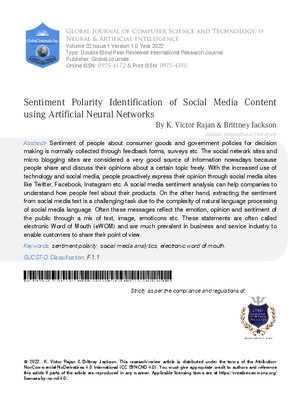Abstract
Sentiment of people about consumer goods and government policies for decision making is normally collected through feedback forms surveys etc The social network sites and micro blogging sites are considered a very good source of information nowadays because people share and discuss their opinions about a certain topic freely With the increased use of technology and social media people proactively express their opinion through social media sites like Twitter Facebook Instagram etc A social media sentiment analysis can help companies to understand how people feel about their products On the other hand extracting the sentiment from social media text is a challenging task due to the complexity of natural language processing of social media language Often these messages reflect the emotion opinion and sentiment of the public through a mix of text image emoticons etc These statements are often called electronic Word of Mouth eWOM and are much prevalent in business and service industry to enable customers to share their point of view
This work is licensed under a Creative Commons Attribution 4.0 International License.
Copyright (c) 2022 Authors and Global Journals Private Limited

